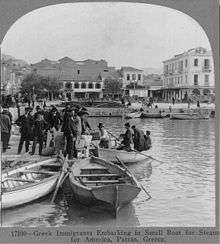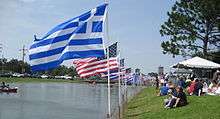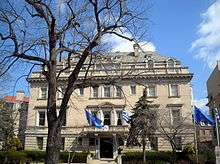Greece–United States relations
 |
|
Greece |
United States |
|---|---|
Greek-American relations refer to bilateral relations between Greece and the United States of America.
Due to the strong political, cultural and religious ties between the two nations, Greece and the United States today enjoy excellent diplomatic relations and consider each other a friendly nation. Both countries are members of several international organizations such as the Organization for Security and Co-operation in Europe (OSCE), the Organisation for Economic Co-operation and Development (OECD), and NATO, and both are founding members of the United Nations.
The United States and Greece have long-standing historical, political, and cultural ties based on a common western heritage, shared democratic values, and participation as Allies during World War I, World War II, the Korean War, and the Cold War. The U.S. is the largest foreign investor in Greece; direct U.S. foreign investment in Greece was about $4.5 billion in 2006.
Greece has an embassy in Washington, D.C. and consulates-general in several U.S. cities. The United States has an embassy in Athens and a consulate-general in Thessaloniki.
History


The first draft of the Monroe Doctrine in 1823, included praise of the Greek rebels in their revolt against the Ottoman Empire. American opinion strongly supported Greece. However Secretary of State John Quincy Adams strongly objected and that passage was dropped. The final text indicated the U.S. government had no intention of interfering in European affairs.[1] However, as Angelo Repousis shows, private citizens including philanthropists, missionaries and political activists inspired by a vision of ancient Greece were eager to become involved in Greek affairs.[2]
On November 9, 1837, the United States recognized the independence of Greece when the American Minister at London signed a treaty of Commerce and Navigation with the Greek Minister at London. This act marked the first negotiation of the United States with Greece and represented the US's recognition of Greece as in independent country in the early 1800s.[3] Within this same year, the first American Consul Gregory A. Perdicaris took up his position in Athens. This mid-19th century treaty established the Greek-U.S. relations in part to help liberate and establish Greece as a separate country from the Ottoman Empire.[3]
The U.S. was active in providing humanitarian aid to Greece after the devastation it suffered in World War I.[4]
During World War II, the US opposed the British plan to restore King George II of Greece to the throne because he was closely associated with fascism. Instead the U.S. helped to establish a regency and did not oppose British efforts to defeat the Communist insurgents.[5]
The British took a leading role in helping the Greek government fight the insurgency. When its financial crisis forced it to cut back, the British turned that role over to the U.S. in 1946. In 1947 the U.S. proclaimed the Truman Doctrine, promising assistance to governments resisting communist subjugation, and began a period of substantial financial and military aid. The U.S. provided Greece with more than $11.1 billion in economic and security assistance since 1946. Economic programs were phased out by 1962, but military assistance continued. In fiscal year 1995, Greece was the fourth-largest recipient of U.S. security assistance, receiving loans totaling $255.15 million in foreign military financing.[6][7]
In 1953, the first defense cooperation agreement between Greece and the United States was signed, providing for the establishment and operation of American military installations on Greek territory. The current "mutual defense cooperation agreement" provides a continued U.S. military support to Greece and the operation by the U.S. of a major military facility at Souda Bay, Crete.
The alliance between Greece with the United States continues through the active role of both countries in NATO since 1949.
Trade and Foreign Direct Investment

Mainly the Greek products exports to the United States involve petroleum products, cement, tobacco, fur products, olive oil, marble, clothing articles, steel products, pipes, and refractory products. On the other hand, U.S. imports to Greece mostly are industrial and agricultural products and machinery, telecommunications equipment, electrical equipment, computers and electronic equipment, timber, medical and pharmaceutical items, machinery and parts, skins, and wood-pulp.[8] Even though the United States impose restrictions on the importation of certain fresh or processed agricultural products there is full freedom of sale of Greek industrial products in the whole U.S. market. Also the EU-United States Agreement signed in May 1993 allows Greek enterprises to access to U.S. public contracts. Trade between the two countries amounted to nearly a billion in 2010.[9] Due to the Credit Cruch Crisis since 2008 that has negatively affected Greek economy, thousands of U.S. firms have shifted their productive activities from other Balcan countries and Italy to Greece due to lower costs of production.[10] The Greece-US Economic & Commercial Cooperation Committee (ECCC) is also currently working to bilaterally expand trade flow and cooperation, and widen their market in Southeastern Europe, the Black Sea and the Middle East.[8]
Military collaboration


Bilateral Greek-U.S. military relations can be dated back to the early 19th century when Greece was fighting for their independence against the Ottoman Empire. During the Greek Philhellene movement, the two nations found commonality under their values of freedom and democracy. Under the Marshall Plan, US military played a role in helping the country establish their democracy and independence during the late 1800s. Military collaboration stemming from previous wars like World War I and World War II have set the foundation for the two countries as firm allies. Greece and the U.S. have also been allies through the Cold War as well as conflicts in Bosnia, Kosovo, and Afghanistan within this past century.[11][12]
The U.S.-Greek Defense Industrial Cooperation Agreement,[13] which was signed in September 8, 1983, regulates defense and intelligence relations between Greece and the United States. The agreement was most recently extended in 2015.[14] During the Gulf War collaboration was strengthened relations between Greece and the United States, as Greece sent military and medical assistance to the U.S. forces in the Gulf region. In May 1995 Greece Defence Ministry organised the "NEW SPIRIT 95" military exercises in the area of Karditsa as a mean to foster military cooperation between Greece, Albania, Romania, Bulgaria and the United States. In parallel, exchange of visits between high-level political and military officials to the two countries such as that of Condoleezza Rice to Athens reinforced cooperation between Greece and the United States in the areas of fight against terrorism and the war against drugs. Additionally the port of Thessaloniki is open to NATO exercises in the Eastern Mediterranean and Greece has been a main contributor to NATO operations in Afghanistan, including counterterrorism and counter-piracy maritime efforts.[15][16] Greece and the U.S are also closely cooperating in the coalition for the fight against the Islamic State, with Greece providing technical and arms support to the U.S.-led coalition in its efforts to drive out ISIL from Iraqi and Syrian territories.
Diplomatic representation
Greece is officially represented in the United States through its embassy in Washington, D.C. and consulate generals in the cities of Atlanta, Boston, Chicago, Los Angeles, New Orleans, New York City, Houston, and San Francisco. The United States has an embassy in Athens and a consulate general in Thessaloniki. Both Greece and the United States share membership in various international organisations with most important being the United Nations, North Atlantic Treaty Organization, Euro-Atlantic Partnership Council, Organization for Security and Cooperation in Europe, Organization for Economic Cooperation and Development, International Monetary Fund, World Bank, and World Trade Organization. Additionally Greece has been a permanent observer to the Organization of American States.
Greek-American community


The earliest Greek immigrants date back to the 1760s, although the first significant Greek community was not established until the 1850s in New Orleans, LA. The first Greek consulate and Greek Orthodox Church in the US were founded in New Orleans as well. Immigration of Greeks into the US was at its peak in 1945 after damage of the World Wars and Greek Civil War had left their economy in ruins. After admittance of Greece into the EU in 1981, immigration of Greeks into the US greatly decreased. As of 1999 there were 72,000 Greek-Americans who had migrated to Greece, but now those number might be minimal due to the current economic crisis in the EU and Greece.[17]

The 2000 US Census showed 1,153,295 Greeks living in the US. About 3 million Americans are of Greek ancestry.[18] Greek-Americans are an established, well-organized community in the U.S. (several notable politicians, including former Vice-President Spiro Agnew, and Senators Olympia Snowe, Paul Sarbanes and Paul Tsongas are of Greek ancestry as well as 1988 Presidential candidate and former Massachusetts Governor Michael Dukakis), and they help cultivate close political and cultural ties with Greece. There are several political advocacy groups founded by Greek-Americans that seek to bring awareness of ongoing public and economic issues occurring in Greece. The American Hellenic Council has been in service sine 1974.[19] The Federation of Hellenic Societies of Greater New York has been in service even longer, since 1938, and likewise seeks to strengthen the Greek-American community in New York by being a voice to the Greek people.[20]
Greek Lobby in the United States
A group of Greek American lawyers, lobbyists, public relations firms are working under the American Hellenic Institute to promote the national interests of Greece in the U.S. Congress in cooperation with other national lobbies in the United States, with most important being the Israeli lobby and to a lesser extent the Armenian lobby.
Visits
See also
- Foreign relations of Greece
- Foreign relations of the United States
- Greek American
- Greece lobby in the United States
Footnotes
- ↑ Jay Sexton (2011). The Monroe Doctrine: Empire and Nation in Nineteenth-Century America. Farrar, Straus and Giroux. pp. 59–60.
- ↑ Angelo Repousis, Greek-American Relations from Monroe to Truman (2013)
- 1 2 "Greece - Countries - Office of the Historian". Retrieved 2 April 2016.
- ↑ Dimitra Giannuli, "American Philanthropy in Action: The American Red Cross in Greece, 1918-1923," East European Politics & Societies (1996) 10#1 pp 108-132.
- ↑ Lawrence S. Wittner, "American Policy Toward Greece During World War II," Diplomatic History (1979) 3#2 pp p129-149. online
- ↑ Judith S. Jeffrey, Ambiguous Commitments and Uncertain Policies: The Truman Doctrine in Greece, 1947–1952 (2000)
- ↑ Howard Jones, "A New Kind of War": America's Global Strategy and the Truman Doctrine in Greece (1989)
- 1 2 "Economic and Trade Relations". Retrieved 2 April 2016.
- ↑ "WPS - USA Foreign Trade with Greece". World Port Source. Retrieved 2 April 2016.
- ↑ http://www.cnbc.com/id/35369940/Greece_Crisis_May_Be_US_Investment_Opportunity_Stock_Picker
- ↑ "U.S.-Greece Relations and Regional Issues". Retrieved 2 April 2016.
- ↑ "Greece". U.S. Department of State. Retrieved 2 April 2016.
- ↑ Defense Industrial Cooperation Agreement (PDF). Office of the Secretary of Defense http://www.acq.osd.mil/dpap/Docs/mou-greece.pdf. Missing or empty
|title=(help) - ↑ "TREATIES AND OTHER INTERNATIONAL ACTS SERIES 14-625.1" (PDF). US Dept of State.
- ↑ "Greek Military Presence in Afghanistan Not Increasing". Retrieved 2 April 2016.
- ↑ "Relation between Greece, the United States, Canada and the Latin American countries". Retrieved 2 April 2016.
- ↑ "Federaion's Histiry". Retrieved 2 April 2016.
- ↑ United States Department of State: Background Note: Greece
- ↑ http://www.americanhellenic.org/about.php
- ↑ "FEDERATION'S HOME". Retrieved 2 April 2016.
Further reading
- Amen, Michael Mark. American Foreign Policy in Greece 1944/1949 (P. Lang, 1978)
- Couloumbis, Theodore A. Greek political reaction to American and NATO influences (Yale University Press, 1966)
- Couloumbis, Theodore A., and John O. Iatrides, eds. Greek-American relations: a critical review (Pella Publishing Company, 1980)
- Harris Jr, William D. "Instilling Aggressiveness: US Advisors and Greek Combat Leadership in the Greek Civil War, 1947-1949." Thesis, Army Command And General Staff College (Fort Leavenworth Kansas, 2012). online
- Miller, James Edward. The United States and the Making of Modern Greece: History and Power, 1950-1974 (2009) online
- Nalmpantis, Kyriakos. "Time on the Mountain: The Office of Strategic Services in Axis-Occupied Greece, 1943-1944" PhD dissertation Kent State University, 2010. online
- Repousis, Angelo. Greek-American Relations from Monroe to Truman. (Kent State University Press, 2013), a scholarly survey since 1820s
- Stathakis, George. "US Economic Policies in Post Civil War Greece, 1949-1953: Stabilization and Monetary Reform." Journal of European Economic History (1995) 24#2 pp: 375-404.
- Zervakis, Peter A. "The Role of the 'Justice For Greece Committee' for the American Involvement in Greece after World War II," Balkan Studies (1997) 38#1 pp 159–196
- Zervakis, Peter A. "The Greek Diaspora in the United States and American Involvement in Greece after World War II," Modern Greek Studies Yearbook (1998), Vol. 14, pp 213–240.

.svg.png)
